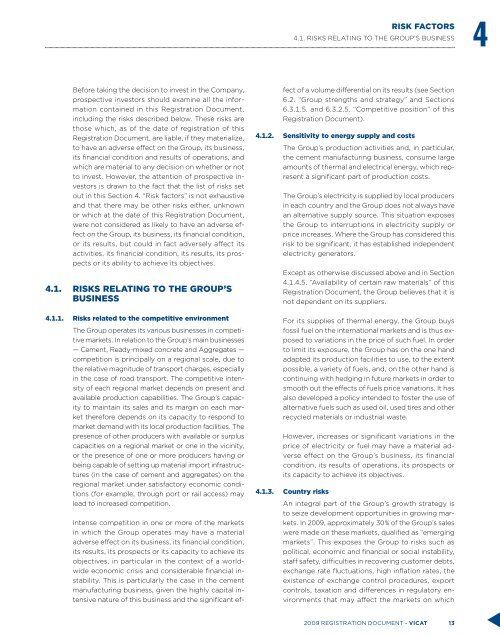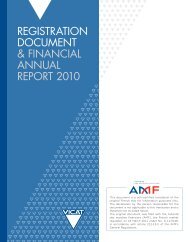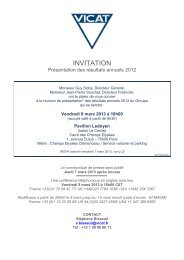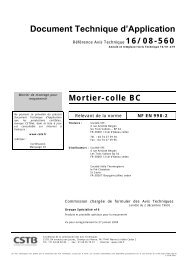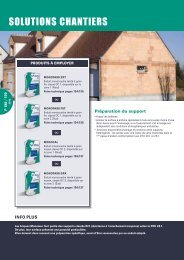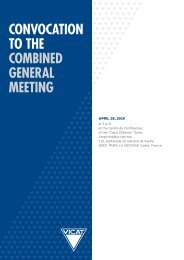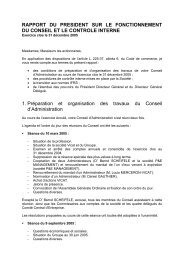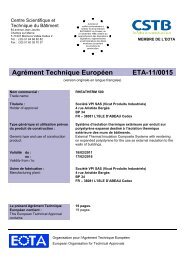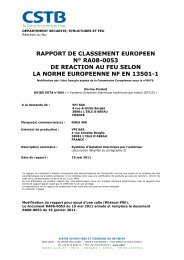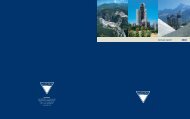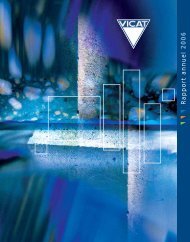6 - Vicat
6 - Vicat
6 - Vicat
- No tags were found...
Create successful ePaper yourself
Turn your PDF publications into a flip-book with our unique Google optimized e-Paper software.
Risk factors4 4.1. RISKS RELATING TO THE GROUP’S BUSINESSBefore taking the decision to invest in the Company,prospective investors should examine all the informationcontained in this Registration Document,including the risks described below. These risks arethose which, as of the date of registration of thisRegistration Document, are liable, if they materialize,to have an adverse effect on the Group, its business,its financial condition and results of operations, andwhich are material to any decision on whether or notto invest. However, the attention of prospective investorsis drawn to the fact that the list of risks setout in this Section 4. “Risk factors” is not exhaustiveand that there may be other risks either, unknownor which at the date of this Registration Document,were not considered as likely to have an adverse effecton the Group, its business, its financial condition,or its results, but could in fact adversely affect itsactivities, its financial condition, its results, its prospectsor its ability to achieve its objectives.4.1. RISKS RELATING TO THE GROUP’SBUSINESS4.1.1. Risks related to the competitive environmentThe Group operates its various businesses in competitivemarkets. In relation to the Group’s main businesses— Cement, Ready-mixed concrete and Aggregates —competition is principally on a regional scale, due tothe relative magnitude of transport charges, especiallyin the case of road transport. The competitive intensityof each regional market depends on present andavailable production capabilities. The Group’s capacityto maintain its sales and its margin on each markettherefore depends on its capacity to respond tomarket demand with its local production facilities. Thepresence of other producers with available or surpluscapacities on a regional market or one in the vicinity,or the presence of one or more producers having orbeing capable of setting up material import infrastructures(in the case of cement and aggregates) on theregional market under satisfactory economic conditions(for example, through port or rail access) maylead to increased competition.Intense competition in one or more of the marketsin which the Group operates may have a materialadverse effect on its business, its financial condition,its results, its prospects or its capacity to achieve itsobjectives, in particular in the context of a worldwideeconomic crisis and considerable financial instability.This is particularly the case in the cementmanufacturing business, given the highly capital intensivenature of this business and the significant effectof a volume differential on its results (see Section6.2. “Group strengths and strategy” and Sections6.3.1.5. and 6.3.2.5. “Competitive position” of thisRegistration Document).4.1.2. Sensitivity to energy supply and costsThe Group’s production activities and, in particular,the cement manufacturing business, consume largeamounts of thermal and electrical energy, which representa significant part of production costs.The Group’s electricity is supplied by local producersin each country and the Group does not always havean alternative supply source. This situation exposesthe Group to interruptions in electricity supply orprice increases. Where the Group has considered thisrisk to be significant, it has established independentelectricity generators.Except as otherwise discussed above and in Section4.1.4.5. “Availability of certain raw materials” of thisRegistration Document, the Group believes that it isnot dependent on its suppliers.For its supplies of thermal energy, the Group buysfossil fuel on the international markets and is thus exposedto variations in the price of such fuel. In orderto limit its exposure, the Group has on the one handadapted its production facilities to use, to the extentpossible, a variety of fuels, and, on the other hand iscontinuing with hedging in future markets in order tosmooth out the effects of fuels price variations. It hasalso developed a policy intended to foster the use ofalternative fuels such as used oil, used tires and otherrecycled materials or industrial waste.However, increases or significant variations in theprice of electricity or fuel may have a material adverseeffect on the Group’s business, its financialcondition, its results of operations, its prospects orits capacity to achieve its objectives.4.1.3. Country risksAn integral part of the Group’s growth strategy isto seize development opportunities in growing markets.In 2009, approximately 30 % of the Group’s saleswere made on these markets, qualified as “emergingmarkets”. This exposes the Group to risks such aspolitical, economic and financial or social instability,staff safety, difficulties in recovering customer debts,exchange rate fluctuations, high inflation rates, theexistence of exchange control procedures, exportcontrols, taxation and differences in regulatory environmentsthat may affect the markets on which2009 registration document - VICAT 13


